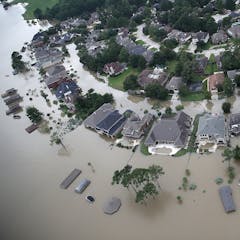
Articles on Home ownership
Displaying 21 - 40 of 91 articles

While authorities such as the Reserve Bank often see them as risky, interest-only loans can be helpful in some circumstances.

The share of homes owner-occupied has slipped only two percentage points since 1996, but the proportion owned outright has slid from 42% to 31%.

Both major parties have policies aimed at helping low and middle income earners buy homes. But they’re both stopgap solutions – and too many buyers, renters and even investors will pay the price.

In Norway, Sweden, Finland and Denmark, housing co-operatives help both renters and those wanting to own a secure, high-quality home. Better housing options for Australia are waiting in plain sight.

Middle- and low-income households are being priced out of owning their homes as average house prices reach levels last seen in the 2000s.

We asked 680 Florida real estate agents what they’re seeing in the market. Here’s what they said.

Canadians need to take steps to better address the financial insecurity of seniors. Otherwise, Canada may encounter a growing tide of desperate seniors in the near future.

When properties are connected, a leasehold provides an important workaround that a freehold cannot. But the system is vulnerable to abuse.

Australians are ready to embrace electric vehicles - but an emissions ceiling would speed up the transition dramatically.

Flood plain statistics can be confusing. There are better ways to think about the risk of severe weather than 100-year storm or flood.

You may not need to sell the family home before entering aged care. There are other options.

Building retrofits are no joke: They make dwellings healthier and more energy-efficient. And when they’re done in low-income housing, they also reduce inequality.

Understanding the experiences of van dwellers is important not just for those looking to cut their ties to rents and mortgages, but also for community planners and employers.

Homes are now not only places to live, but also pensions, savings accounts and social care plans.

Older women have been the fastest-growing group of homeless people in recent years. New research shows about 240,000 women aged 55 or older and another 165,000 women aged 45-54 are at risk.

Voters who own housing are strongly invested in increasing the value of their wealth-generating assets. And they strongly favour the Coalition, which knows to protect their interests.

Public housing renewal often aims for a 70:30 private-public mix of dwellings. Modelling shows applying this mix to Waterloo housing estate would cut the suburb’s social housing share from 30% to 17%.

Coronavirus has made it glaringly obvious how serious the problems with UK housing are.

Australians faces an even more unequal future unless post-pandemic housing policy focuses on equity, solidarity and security. .

Josh Frydenberg’s review of the retirement income system will have to consider the growing hole caused by our decisions to delay buying homes for longer and longer.
